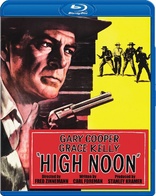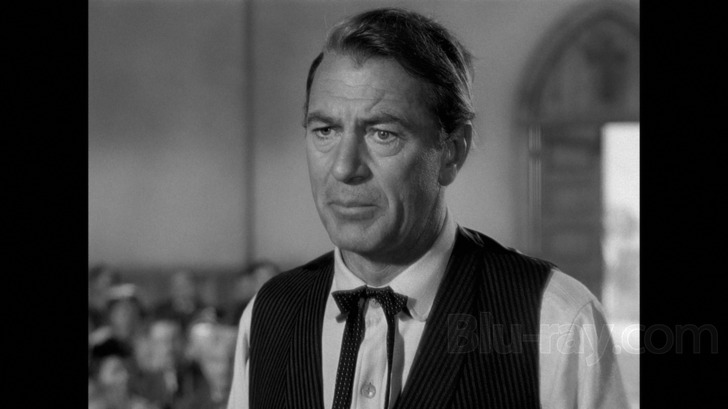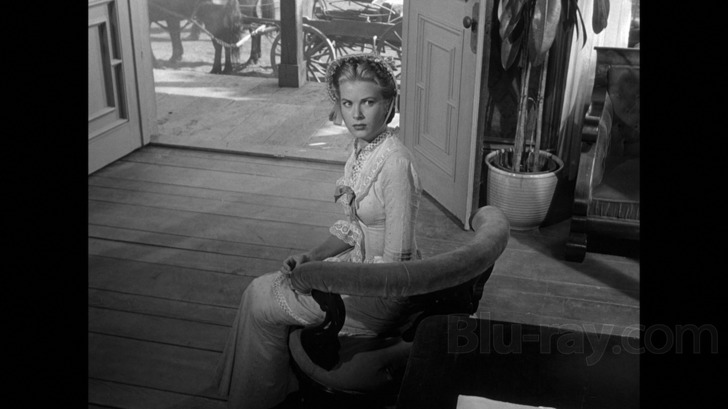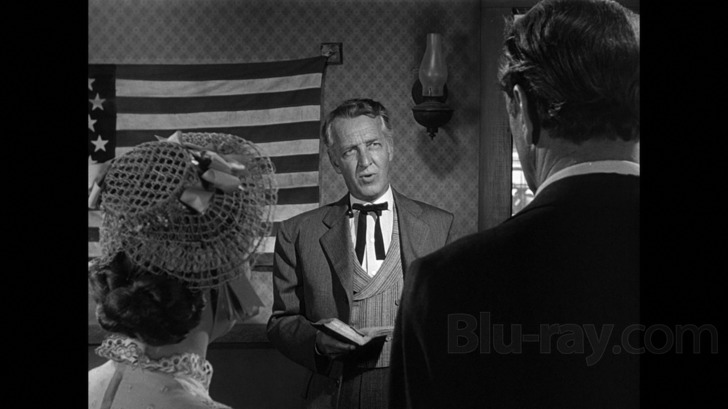High Noon Blu-ray Movie
HomeHigh Noon Blu-ray Movie 
60th Anniversary EditionOlive Films | 1952 | 85 min | Not rated | Jul 17, 2012

Movie rating
8.2 | / 10 |
Blu-ray rating
| Users | 4.2 | |
| Reviewer | 4.0 | |
| Overall | 4.1 |
Overview
High Noon (1952)
A retired Marshal must defend his town from a revengeful villain.
Starring: Gary Cooper, Thomas Mitchell (I), Lloyd Bridges, Katy Jurado, Grace KellyDirector: Fred Zinnemann
| Drama | Uncertain |
| Western | Uncertain |
| Thriller | Uncertain |
Specifications
Video
Video codec: MPEG-4 AVC
Video resolution: 1080p
Aspect ratio: 1.35:1
Original aspect ratio: 1.37:1
Audio
English: DTS-HD Master Audio Mono (48kHz, 16-bit)
Subtitles
None
Discs
25GB Blu-ray Disc
Single disc (1 BD)
Packaging
Slipcover in original pressing
Playback
Region A (C untested)
Review
Rating summary
| Movie | 4.5 | |
| Video | 4.5 | |
| Audio | 3.0 | |
| Extras | 1.0 | |
| Overall | 4.0 |
High Noon Blu-ray Movie Review
Do not forsake this Blu-ray, oh my darlin'.
Reviewed by Jeffrey Kauffman June 22, 2012The fate of high profile catalog titles on Blu-ray has been a rather interesting story, especially now that we’re several years into the high definition era. Some studios, notably Warner Brothers, have excelled at releasing quality catalog product, often in lavish Collectors’ Editions, at least for their very high profile titles like Ben-Hur or Citizen Kane. Though perhaps less lauded than Warner, Paramount has also done excellent work on a number of high value titles, including The Ten Commandments and Breakfast at Tiffany's (the latter title quite unfairly derided for supposed DNR that simply isn’t there). Universal, of course, is a different matter entirely, usually the bane of withering comments that lambaste its persistent use of DNR on catalog releases (even if I personally seldom find the results as abhorrent as many seem to). Perhaps at least a little unexpectedly, a whole slew of supposedly "lesser" catalog releases have either not seen the Blu-ray light of day (yet) or have been relegated to a kind of secondary market, where we've seen Paramount (or Paramount controlled) titles coming out on Olive Films Blu-rays and both Columbia and Fox catalog titles being released by Twilight Time. Some of these titles might be termed second string catalog releases, and many seem to be getting shuttled off to niche labels like Twilight Time and Olive Films via licensing deals more and more lately, perhaps a sign that the actual studio labels themselves have little to no interest in actually taking the financial risk to release product that may not have sold overly well on VHS or DVD (or in some rare cases may never have been released in any home video format whatsoever before). For all the sniping about price points and lack of extras that regularly enflame discussions about both of the niche labels listed above, my personal opinion is lovers of classic films owe these little labels a debt of gratitude for at least testing the market waters with releases that otherwise might not see the light of day, even if there are certain things to complain about now and again. High Noon is a case in point. It regularly makes any number of AFI “best of” lists, it won Gary Cooper a well deserved Best Actor Academy Award, it produced one of the most memorable and best loved theme songs of all time (another Oscar winner), and it in its own small way reinvented the Western. And yet Paramount (which controls distribution of this United Artists release) has never seen fit to release it on Blu-ray itself, leaving that up to Olive Films via its licensing deal.

Though there had been unique Westerns before High Noon (John Ford’s opuses spring instantly to mind), for most moviegoers a Western meant simple characters broad drawnly, so glyph-like that they frequently literally wore white hats and black hats to denote their class as either hero or villain. Mix in a few (sometimes a lot of) gun battles, the more than occasional marauding “Indians” (back when that was what Native Americans were routinely called), and the broad outlines of the genre were firmly in place. That may be one reason critics and audiences didn’t quite know what to make of High Noon when it premiered in 1952. This was a decidedly low key Western, with a brooding quality and virtually no action whatsoever save for the final few minutes when all hell breaks loose.
The basic setup of High Noon is simplicity itself, almost what might be termed high concept (no pun intended): Marshal Will Kane (Gary Cooper), who has brought law and order to the previously crime ridden streets of Hadleyville, has just married a Quaker named Amy (Grace Kelly), and has resigned his position. The very day he weds he finds out a vicious criminal he had arrested has been released from prison and is headed back to Hadleyville with his gang. Amy wants Will to simply leave with her, but Will fears the gang will hunt him down no matter what he chooses to do, and so he decides to stay, reclaiming his badge and vowing to fight the bad guys, no matter what the consequences. Unfortunately, the townspeople are curiously divided about how exactly to handle this looming threat, and Will finds no takers when he asks for Deputies to help him fight the gang. In the meantime, Amy has threatened to leave one way or the other. It should be mentioned that all of these developments take place in “real time”, i.e., the approximately 90 or so minutes the film lasts, another somewhat unusual approach for a film of that era.
High Noon was the brainchild of scenarist Carl Foreman, though due to an unfortunate concatenation of events, producer Stanley Kramer is often credited as the driving force behind the film (notice in the trailer—included on this Blu- ray—how the film is labeled a Stanley Kramer film, rather than a Fred Zinnemann one). While High Noon was in production, Foreman was one of a gaggle of Hollywood artists caught up in the Red Scare and forced to testify before the House Un-American Activities Committee. Unlike “fellow traveler” Elia Kazan, Foreman refused to name names, and as a result he was blacklisted (he moved to England where he continued to write under various pseudonyms or without receiving proper credit at all, as was the case with his contributions to The Bridge On the River Kwai). Accounts differ as to how supportive Kramer was through this process, but there’s little doubt that the HUAC hearings promptly put an end to Foreman’s Hollywood career, and as a result his contribution as co-producer was removed from High Noon’s credits, though his screenplay credit was allowed to stand (a fairly controversial decision), and he ultimately received an Oscar nomination for his work.
All of this political backstory plays into High Noon, for the film is at its most fundamental an examination of personal courage under enormous peer pressure. Seemingly everyone in Hadleyville is espousing a “go along to get along” attitude, hoping that the gang will not do anything too nefarious, especially if Will Kane isn’t there to raise their hackles. The supporting cast debating what to do includes such heavyweights as Thomas Mitchell, Lloyd Bridges and Lon Chaney, Jr., who has never been better and should erase any indelible memories of Larry Talbot and The Wolfman in most viewers’ minds.
Director Fred Zinnemann stages things effortlessly, but he also displays some unusual panache in several key sequences. Gunsmoke’s opening titles borrowed Zinnemann’s approach here of having Kane basically walk “over” the camera, and there’s another fantastic crane shot pulling back from Kane in one memorable moment which reveals just how desperately alone Kane really is. Performances are uniformly excellent, including Katy Jurado as a Hispanic store owner who has a history with Kane, his former Deputy (Bridges) and the chief bad guy (she got around, so to speak).
What is so bracing about High Noon is just how low key it is. This is a film that moves relentlessly through increasing desperation without so much as a hint of hyperbole. Fifties audiences didn’t know what to make of a Western that didn’t feature “shoot ‘em up” moments, thunder horse hooves and other well worn tropes of the idiom. Luckily we can look back on High Noon now from the vantage point granted by all the films that followed in its wake and aped some of its techniques, and realize it for the undeniable masterpiece it is.
High Noon Blu-ray Movie, Video Quality 

High Noon is presented on Blu-ray courtesy of Olive Films with an AVC encoded 1080p transfer in 1.35:1. The results here are mostly spectacular, with Floyd Crosby's evocative black and white cinematography looking gorgeously lustrous, which is not to say that the dusty open prairie ambience of the film isn't presented in all its drab "glory". Contrast is extremely strong throughout this presentation, with solid renderings of very deep and true black levels, impressive variations in gray scale, and clear and decisive whites. The elements here are in amazingly good condition, with hardly a sign of damage anywhere. Fine object detail is excellent throughout, though some of the midrange shots suffer from some very slight softness (perhaps due to having been shot by a second unit). About the only noticeable artifact here is some extremely minor aliasing and moiré on some of the natty tweed jackets (Thomas Mitchell's is a good example). Otherwise this is yet another very impressive catalog release from Olive, which continues to offer product that doesn't appear to have undergone excessive digital tweaking, retaining a nicely natural filmlike appearance.
High Noon Blu-ray Movie, Audio Quality 

High Noon's lossless DTS-HD Master Audio Mono gets the job done within its own narrow confines, but the track is hampered by a somewhat more noticeable boxiness than several other recent Olive releases which also featured DTS-HD Master Audio Mono audio mixes. The boxiness is most apparent in the midrange, which unfortunately affects Dmitri Tiomkin's Oscar winning score as much as it does some of the dialogue. One interesting thing about this lossless offering is that it makes quite clear that at least some of the dialogue was post looped; listen for example to a couple of Lloyd Bridges' lines in the big barn showdown with Gary Cooper, lines which have a noticeably different amplitude and hall ambience than the bulk of his dialogue in the scene. There's no outright damage to report here, but this track, while certainly acceptable and nothing to really worry about, does show its age a bit more than some others of this general vintage.
High Noon Blu-ray Movie, Special Features and Extras 

There's both good news and bad news with regard to a supplemental package on this Blu-ray. As fans of Olive Films releases know, more often than not there are no supplements of any kind. So the good news is there are in fact a couple of extras included here (detailed below). The bad news is that several supplements that have graced previous DVD releases, including an incredibly informative commentary featuring many of the talents involved in the film as well as historians, are not included here.
- The Making of High Noon (SD; 22:11) is a thorough and entertaining overview of the film and its history and importance, hosted by Leonard Maltin. Stanley Kramer, Fred Zinnemann, Lloyd Bridges, and two sons of people associated with the film, David Crosby (son of cinematographer Floyd) and John Ritter (son of Tex, who sang the theme song) are interviewed.
- Theatrical Trailer (SD; 2:29)
High Noon Blu-ray Movie, Overall Score and Recommendation 

High Noon is one of the few films which have only grown in stature and appreciation since its original release. The film's unrelenting originality and focused tone was off putting in 1952, but it seems curiously "right" to modern day sensibilities. Cooper is brilliantly understated in this role, and he's surrounded by a top flight cast that hits all the right notes. Zinnemann stages things incredibly effectively and Foreman's screenplay is a model of concision and brilliant structure. While it would have been preferable to have had more supplements on this release, the video quality here is outstanding and the audio is at the very least acceptable. Highly recommended.
Other editions
High Noon: Other Editions
Similar titles
Similar titles you might also like

The Man Who Shot Liberty Valance 4K
1962

Decision at Sundown 4K
1957

3:10 to Yuma
1957

Ride Lonesome
1959

My Darling Clementine
Theatrical and Prerelease Versions
1946

Unforgiven 4K
1992

Rio Bravo
1959

Winchester '73
1950

A Fistful of Dollars 4K
Per un Pugno di Dollari
1964

Once Upon a Time in the West 4K
Standard Edition | C'era una volta il West 4K
1968

Last Train from Gun Hill
Paramount Presents #18
1959

High Plains Drifter 4K
1973

Pat Garrett and Billy the Kid 4K
50th Anniversary Release (4K/BD), Original Theatrical Release (4K/BD), and Final Preview Cut (BD)
1973

One-Eyed Jacks
1961

Shane 4K
1953

The Proposition
2005

The Hired Hand
Arrow Academy
1971

The Searchers 4K
Warner Archive Collection
1956

Buchanan Rides Alone 4K
1958

The Magnificent Seven 4K
1960


